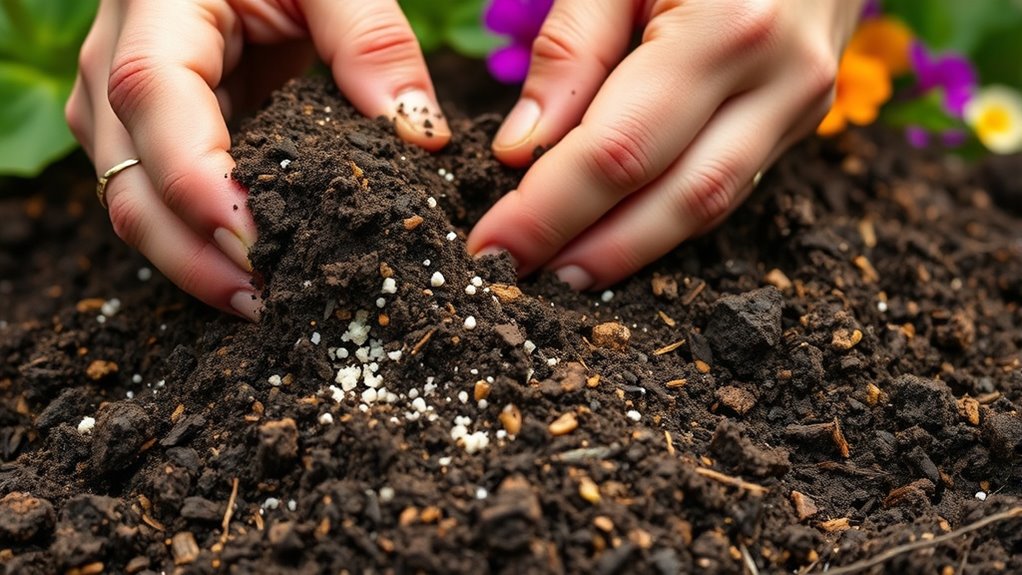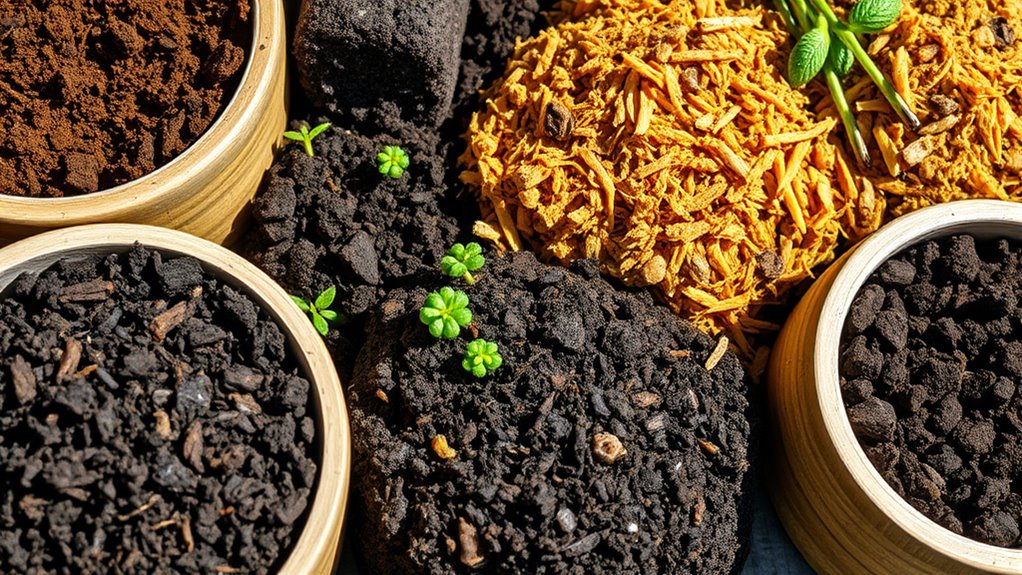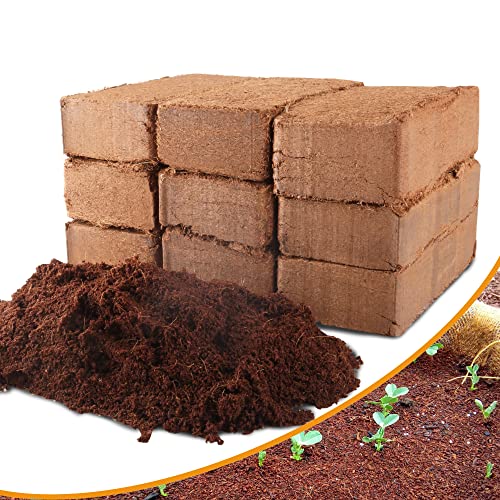If you’re looking to boost your garden’s health in 2025, I recommend exploring top organic soils like Coco Bliss Coco Coir, Espoma Vegetable & Flower Garden Soil, and FoxFarm Ocean Forest. These mixes improve soil structure, retain moisture, and support healthy roots with natural ingredients. Products like Wakefield Biochar and Back to the Roots offer eco-friendly options that promote sustainable growing. Keep going to discover more about these soil choices and how they can elevate your gardening game.
Key Takeaways
- Choose OMRI-listed, all-natural soils with nutrients, microbes, and organic amendments for healthy plant growth.
- Opt for eco-friendly blends containing biochar, coconut coir, worm castings, and kelp to improve soil health sustainably.
- Select versatile soils suitable for containers, raised beds, seed starting, and native soil enhancement.
- Consider products with long-lasting nutrients, water retention, and microbial activity to support vigorous, vibrant plants.
- Prioritize certified organic soils made in the USA for quality, safety, and environmental responsibility in your gardening.
Coco Bliss Organic Coco Coir for Plants
Are you looking for a sustainable, chemical-free soil amendment that can boost your plant growth? I highly recommend Coco Bliss Organic Coco Coir. Made from renewable coconut husks, it’s OMRI-listed for organic gardening. This 10-pound brick expands easily with water, creating a clean, nutrient-friendly medium. It improves soil structure by enhancing aeration and drainage, while its moisture retention keeps plants hydrated. Plus, it adds organic matter as it decomposes, supporting healthy growth. Eco-conscious and versatile, Coco Bliss works well for seedlings, herbs, vegetables, and flowers. Many gardeners love its low dust, natural color, and ease of use, making it a must-have for sustainable gardening.
Best For: gardeners seeking a sustainable, organic soil amendment that enhances moisture retention, aeration, and promotes healthy plant growth for indoor and outdoor plants.
Pros:
- OMRI-listed and made from renewable coconut husks, ensuring eco-friendliness and organic suitability
- Excellent moisture retention, aeration, and improves soil structure for healthy roots
- Easy to use, low dust, quick expansion in water, and versatile for various gardening needs
Cons:
- Some users prefer larger-sized chips for easier handling and planting
- May require additional nutrients depending on specific plant needs
- Can be bulky to store or transport in its expanded form
Coco Coir 650g Bricks (5-Pack) Organic Coconut Coir for Gardening
If you’re looking for an eco-friendly, reliable soil amendment for your garden, the Coco Coir 650g Bricks (5-Pack) offers a perfect solution. Made from renewable coconut husks, these pre-rinsed, pre-screened bricks expand into fluffy, nutrient-rich soil when soaked. They improve soil structure, aeration, and drainage, while retaining moisture to keep plants hydrated longer. With a neutral pH and high nutrient exchange capacity, they support healthy growth for vegetables, herbs, and flowers. The environmentally sustainable alternative to peat moss, these bricks are easy to use, store well, and provide a clean, organic addition to any garden, making gardening more efficient and eco-conscious.
Best For: home gardeners, hobbyists, and professional growers seeking an organic, sustainable soil amendment to improve plant health and soil quality.
Pros:
- Made from renewable coconut husks, an eco-friendly and sustainable resource.
- Expands significantly when soaked, providing a large amount of fluffy, nutrient-rich soil.
- Improves soil structure, aeration, drainage, and moisture retention for healthy plant growth.
Cons:
- Slightly higher cost compared to traditional soil amendments like peat moss.
- Individual bricks are wrapped, which may generate plastic waste if not recycled properly.
- Requires soaking and expansion time before use, which may be less convenient for quick planting projects.
Compressed Organic Potting Soil, 2 Pack
Compressed Organic Potting Soil, 2 Pack is an ideal choice for small-scale gardeners and indoor plant enthusiasts seeking a nutrient-rich, easy-to-use soil amendment. Each 2-pound bag expands up to 4 times with water, creating about 3 gallons of rich, living soil infused with worm castings, coconut coir, compost, humic acids, kelp, and beneficial microbes like mycorrhizae. It’s versatile for seeds, transplants, containers, or garden beds. The soil stays moist three times longer, supports healthy root growth, and improves water and nutrient uptake. Lightweight and resealable, it’s perfect for targeted applications, starter plants, or enhancing existing soil, making gardening simpler and more effective.
Best For: small-scale gardeners, indoor plant enthusiasts, and those seeking a nutrient-rich, easy-to-use soil amendment for potted plants, seeds, or garden beds.
Pros:
- Expands up to 4X with water, providing approximately 3 gallons of rich, living soil from just 2 pounds.
- Contains natural nutrients, beneficial microbes, and mycorrhizae to promote healthy root development and vibrant plant growth.
- Lightweight, resealable packaging makes it convenient for targeted applications and small-scale gardening projects.
Cons:
- Higher cost relative to volume, which may be less economical for large-scale gardening.
- Can produce an odor if not properly aerated, requiring mixing with charcoal or vermiculite indoors.
- Limited volume per package makes it more suitable for small projects rather than extensive garden use.
Espoma Organic Vegetable & Flower Garden Soil (2 Pack)
For gardeners committed to organic practices, Espoma Organic Vegetable & Flower Garden Soil (2 Pack) offers an ideal solution. This natural, nutrient-rich mix is perfect for planting or transplanting, enhancing native soil without synthetic chemicals. Enriched with earthworm castings, it provides essential nutrients that promote vigorous growth for vegetables, flowers, and fruits. Packaged in two 24-pound bags, it’s easy to use and highly effective, with many users reporting thriving plants like tomatoes and flowers. Though slightly more expensive, its quality, fast shipping, and organic integrity make it a worthwhile investment for those dedicated to sustainable gardening.
Best For: organic gardeners seeking a nutrient-rich, chemical-free soil mix to enhance vegetable, flower, and fruit growth in their garden.
Pros:
- Enriched with earthworm castings for natural, essential nutrients
- Supports vigorous plant growth and healthy development
- Packaged in convenient, lightweight 24-pound bags with fast, free shipping
Cons:
- Slightly more expensive than some bulk or non-organic soil options
- Some bags may arrive ripped, requiring inspection upon delivery
- Can attract gnats if stored indoors for extended periods
FoxFarm Ocean Forest Potting Soil, 12qt
Looking for a nutrient-rich potting soil that supports a wide variety of plants? FoxFarm Ocean Forest Potting Soil is an excellent choice. It’s a 12-quart blend designed for container, indoor, and outdoor use, with a light, aerated texture and pH balance for ideal nutrient absorption. The mix includes aged forest products, sphagnum peat moss, earthworm castings, bat guano, and fish emulsion, creating a rich environment for everything from roses to succulents. It retains moisture well but drains properly, promoting healthy root growth. Ready to use straight from the bag, it’s versatile and highly rated for vibrant, vigorous plants, making it a favorite among gardeners.
Best For: gardeners and plant enthusiasts seeking a nutrient-rich, versatile potting soil suitable for a wide range of container, indoor, and outdoor plants.
Pros:
- Rich, organic nutrients from ingredients like earthworm castings, bat guano, and fish emulsion promote vigorous growth and lush foliage.
- Excellent moisture retention combined with proper drainage supports healthy root development and prevents overwatering.
- Ready-to-use straight from the bag, it is easy to handle and compatible with custom fertilizers and seasonal feeding routines.
Cons:
- Slightly higher price point compared to some other potting soils.
- Some users have reported tiny bugs or pests, though these do not typically affect overall plant health.
- The organic composition may require supplemental nutrients for very specific or high-demand plants.
Burpee 9 Quarts Organic Potting Soil Mix for Indoor and Outdoor Plants
If you’re passionate about growing healthy, vibrant plants organically, Burpee’s 9 Quarts Organic Potting Soil Mix is an excellent choice. This all-natural, OMRI-listed soil combines plant food and coconut coir to support seedling development, root growth, and flowering. The coconut coir retains moisture, preventing waterlogging and ensuring consistent hydration. It releases nutrients immediately and provides slow-release feeding for up to three months, reducing the need for frequent fertilizing. Perfect for containers, raised beds, or seed starting, this versatile mix is lightweight, effective, and highly rated for producing healthier, stronger plants with better blooms and foliage.
Best For: home gardeners and indoor plant enthusiasts seeking organic, nutrient-rich soil to promote healthy growth, vibrant blooms, and strong roots in containers, raised beds, or seed starting.
Pros:
- OMRI-listed and all-natural, ensuring organic certification and safety for edible plants
- Retains moisture effectively with coconut coir, reducing watering frequency and preventing waterlogging
- Provides immediate nutrients along with a slow-release feed for up to three months, supporting sustained plant health
Cons:
- Slightly higher price point compared to conventional potting mixes, which may concern budget-conscious gardeners
- Requires rehydration of dry mix before planting, especially for seedlings, to prevent hydrophobic issues
- Limited to a 9-quart size, which may necessitate multiple purchases for larger gardening projects
Miracle-Gro Organic Outdoor Potting Mix
Miracle-Gro Organic Outdoor Potting Mix stands out as an excellent choice for gardeners seeking a ready-to-use, organic soil solution for container plants. This mix is ideal for vegetables, herbs, flowers, and perennials, with a natural fertilizer lasting up to two months. Made from responsibly sourced peat and upcycled green waste, it’s OMRI Listed, ensuring organic certification. Its lightweight, rich texture retains moisture well and promotes healthy growth. I appreciate how easy it is to work with—just loosen roots, fill containers, and water thoroughly. Replenishing nutrients bi-annually keeps plants thriving. Overall, it’s a sustainable, effective option for vibrant, organic container gardening.
Best For: home gardeners seeking an organic, ready-to-use potting mix for container vegetables, herbs, flowers, and perennials that promotes healthy growth and sustainability.
Pros:
- OMRI Listed and made from responsibly sourced and recycled materials, ensuring organic certification and eco-friendliness
- Rich, lightweight, and moisture-retentive texture that supports healthy plant development
- Easy to use, with clear instructions for planting, watering, and replenishing nutrients
Cons:
- May contain debris or a strong scent initially, which can dissipate outdoors but could be off-putting indoors
- Requires re-potting every two months to prevent soil compaction and maintain nutrient levels
- Slightly more expensive than non-organic alternatives, which could be a consideration for larger projects
Back to the Roots Organic Coir, 51 Quart Expanding Soil
Back to the Roots Organic Coir, 51 Quart Expanding Soil, is an excellent choice for gardeners seeking a sustainable, peat-free soil option that’s easy to handle and versatile. Made from 100% organic coconut coir, it expands into over 2 cubic feet of rich, fluffy soil when hydrated, making it convenient and lightweight. Perfect for seeds, seedlings, and garden improvement, it enhances water retention and aeration, promoting healthy roots. Its fine texture is ideal for small seeds, and it resists compaction over time. Whether used alone or mixed with amendments, this soil supports organic gardening practices and is suitable for both indoor and outdoor use.
Best For: home gardeners, seed starters, and organic enthusiasts seeking a sustainable, easy-to-use soil amendment for indoor and outdoor gardening.
Pros:
- 100% organic, peat-free, and sustainable coconut coir that supports eco-friendly gardening.
- Expands into over 2 cubic feet of nutrient-rich, fluffy soil, making it lightweight and space-efficient.
- Excellent water retention, aeration, and resistance to compaction, promoting healthy root development.
Cons:
- May develop odors over time due to microbial activity, requiring proper management.
- Lacks long-term nutrients; regular fertilization is necessary for sustained plant growth.
- Needs proper hydration and occasional drying to prevent microbial odors and maintain optimal soil health.
40 Pound Bag Garden Magic Organic Topsoil Blend for Indoor and Outdoor Gardening
The Pound Bag Garden Magic Organic Topsoil Blend is an excellent choice for gardeners seeking a versatile, organic soil that works seamlessly both indoors and outdoors. This 40-pound bag is ready to use and ideal for potting, landscaping, and soil improvement. It’s designed to address common soil issues by loosening heavy clay, improving moisture retention, and enhancing garden aesthetics. Made from reed sedge peat, perlite, and sand, it creates a prime environment for healthy plant growth. Whether you’re planting houseplants or revitalizing garden beds, this blend offers consistent quality, organic benefits, and ease of use—perfect for both novice and experienced gardeners.
Best For: homeowners, gardeners, and landscapers seeking a versatile, organic topsoil blend for indoor and outdoor planting and soil improvement projects.
Pros:
- Ready-to-use, easy to apply for both indoor and outdoor gardening needs
- Improves soil structure by loosening heavy clay and enhancing moisture retention
- Organic composition and consistent quality praised by users for healthy plant growth
Cons:
- Packaging may sometimes arrive damaged, leading to soil spillage during shipping
- Some users find alternative products offering similar benefits at a lower price
- Not specifically designed for specialized planting needs like seed starting or hydroponics
Espoma Organic Raised Bed Mix for Gardening (1.5 Cubic Feet)
If you’re looking for a reliable, all-natural soil mix to support healthy plant growth in raised beds or containers, Espoma Organic Raised Bed Mix is an excellent choice. This 1.5-cubic-foot bag is ready to use and packed with organic ingredients like earthworm castings, alfalfa, kelp, feather meal, and proprietary mycorrhizae. It promotes robust root development, better nutrient uptake, and moisture retention. Ideal for vegetables, herbs, flowers, and seedlings, it’s free from chemicals and synthetic additives. Customers love its fresh smell, ease of use, and proven performance, making it a trusted option for sustainable, organic gardening success.
Best For: gardeners seeking a high-quality, organic soil mix for raised beds, containers, and sustainable gardening projects that promote healthy roots and vigorous plant growth.
Pros:
- All-natural, organic ingredients free from synthetic chemicals
- Excellent moisture retention and nutrient support for diverse plants
- Easy to use, blends well, and supports healthy seedlings and mature plants
Cons:
- Slightly more expensive than basic potting soils or individual components
- Limited to 1.5 cubic feet per bag, may require multiple purchases for larger projects
- Some users report it can be heavy to handle due to its organic composition
9-Pack Organic Coco Coir Bricks for Plants
For gardeners seeking an eco-friendly and sustainable soil amendment, packing organic coco coir bricks offers a simple and effective solution. These 9-pack bricks are made from 100% natural fibers harvested from coconut husks, providing excellent water retention and aeration for healthy roots. They expand considerably when soaked, making them easy to use in pots, raised beds, or soil mixes. Heat-treated to remove harmful substances, they’re biodegradable and pH balanced. Just soak the bricks thoroughly, mix with soil or nutrient-rich amendments, and enjoy improved moisture control and plant growth. Compact, lightweight, and eco-conscious, these coco coir bricks are a versatile addition to any gardener’s toolkit.
Best For: gardeners seeking a sustainable, organic soil amendment that enhances water retention and aeration for healthy plant growth.
Pros:
- Made from 100% natural, biodegradable coconut fibers, eco-friendly and sustainable.
- Expands significantly when soaked, making it easy to use in various gardening applications.
- Provides excellent aeration and moisture retention, promoting healthy root development.
Cons:
- Some users report dustiness and difficulty soaking the bricks thoroughly.
- Packaging damage during shipping can cause spillage and handling issues.
- Low natural nutrient content requires mixing with nutrient-rich soil or amendments for optimal plant growth.
Organic Potting Soil for Indoor Plants
Looking for an organic potting soil that’s perfect for indoor plants? I recommend Smart Grower’s Organic Potting Soil, which blends compost, peat, biochar, worm castings, and coco coir into a lightweight, nutrient-rich mix. It’s ready to use, so no need for mixing or amendments, and it drains well while retaining moisture. The soil promotes healthy root growth and supports a variety of indoor plants like Monstera, Snake Plants, and Fiddle Leaf Fig. Customers love its fluffy texture, plant vitality enhancements, and odor-free performance. Made in the USA, it’s pet-safe, eco-friendly, and ideal for boosting your indoor garden’s health naturally.
Best For: indoor plant enthusiasts seeking a natural, nutrient-rich, and easy-to-use organic soil solution for a variety of houseplants and tropicals.
Pros:
- Rich, fluffy texture that retains moisture and promotes healthy root development
- Supports a wide range of indoor plants with natural nutrients and beneficial microbes
- Odor-free, well-draining, and safe for pets and children
Cons:
- Slightly higher cost compared to conventional potting soils
- May need occasional top-ups or fertilization for extremely nutrient-demanding plants
- Limited availability in some retail locations, requiring online purchase
Wakefield Biochar Potting Soil Mix (4 Quarts)
Wakefield Biochar Potting Soil Mix (4 Quarts) stands out as an ideal choice for gardeners seeking a sustainable, nutrient-rich medium that boosts plant health with minimal effort. This organic blend features CarbonBoost technology, mycorrhizae, and probiotics to improve soil structure, aeration, and microbial activity. It promotes strong root growth, better nutrient uptake, and resilience. Its moisture retention technology reduces watering needs by up to 50%, making garden maintenance easier. Made from renewable, carbon-sequestering materials, it’s eco-friendly and supports sustainability. Rated 4.4 stars, users praise its effectiveness across various plants, from tomatoes to roses, for healthier, thriving gardens with less fuss.
Best For: home gardeners and plant enthusiasts seeking an eco-friendly, nutrient-rich soil mix that promotes strong plant growth and reduces watering needs with minimal effort.
Pros:
- Enhances soil structure, aeration, and microbial activity for healthier plants
- Reduces watering frequency by up to 50%, saving time and resources
- Made from renewable, carbon-sequestering materials supporting sustainability
Cons:
- Small bag size may require frequent repurchasing for larger gardens
- Price point could be higher compared to conventional potting soils
- Some users may need to adjust watering schedules initially to accommodate soil changes
Upgraded DUSPRO Orchid Potting Mix with Forest Moss, Pine Bark, Perlite & Pumice
The upgraded DUSPRO Orchid Potting Mix with Forest Moss, Pine Bark, Perlite, and Pumice is an excellent choice for orchid enthusiasts who want a reliable, all-in-one medium that promotes healthy root development and vibrant blooms. This blend supports ideal aeration, moisture retention, and drainage, helping prevent root rot and encouraging strong roots. Its carefully balanced ingredients—forest moss for moisture, pine bark for drainage, and pumice and perlite for aeration—create an ideal environment for various orchid varieties. Conveniently packaged in a 1-quart size, it’s easy to work with and designed to boost orchid health, resulting in beautiful, thriving plants.
Best For: orchid enthusiasts seeking a high-quality, all-in-one potting mix that promotes healthy roots, vibrant blooms, and easy repotting for various orchid varieties.
Pros:
- Supports optimal root development with excellent aeration and moisture retention
- Made with sustainable, high-quality ingredients like forest moss, pine bark, pumice, and perlite
- Easy to use, with a consistent blend that prevents washout and promotes healthy growth
Cons:
- Small 1-quart packaging may require multiple purchases for larger orchid collections
- Shipping delays reported by some customers can affect availability
- May be more expensive than basic orchid mixes due to upgraded ingredients
Back to the Roots Organic Potting Mix (12 Quart)
If you’re searching for a versatile, eco-friendly potting mix that supports healthy plant growth, the Back to the Roots Organic Potting Mix (12 Quart) is an excellent choice. It’s 100% organic and peat-free, made from upcycled plant matter and wood fines sourced across the U.S., reducing environmental impact. Perfect for herbs, vegetables, fruits, and flowers, it offers reliable moisture control with yucca extract and maintains pH balance with dolomitic limestone. Proudly made in the USA, it comes with a satisfaction guarantee. Plus, through the GROWONEGIVEONE program, you can share your gardening success while helping classrooms grow future green thumbs.
Best For: gardeners seeking a versatile, eco-friendly potting mix suitable for herbs, vegetables, fruits, and flowers, with a focus on sustainability and healthy plant growth.
Pros:
- 100% organic and peat-free, environmentally friendly with a lighter carbon footprint
- Incorporates moisture-retaining yucca extract and pH-stabilizing dolomitic limestone for optimal plant health
- Made in the USA with a satisfaction guarantee and community support through the GROWONEGIVEONE program
Cons:
- May be more expensive than conventional potting soils due to organic ingredients
- Limited to 12-quart size, which might not be sufficient for larger gardening projects
- Some users may find the blend less suitable for extremely specific plant needs requiring specialized soil
Factors to Consider When Choosing Organic Gardening Soil

When selecting organic gardening soil, I look at several key factors to ensure healthy plant growth. It’s important to consider organic certification, soil texture, and drainage to match your garden’s needs. Balancing nutrient content, moisture retention, and eco-friendliness helps create a sustainable, thriving garden.
Organic Certification Importance
Why does choosing certified organic soil matter for your garden? Because certification guarantees the soil was produced without synthetic chemicals, pesticides, or GMOs, ensuring it meets strict organic standards. Third-party verification adds credibility, giving you confidence that the product truly aligns with organic principles. Certified soils often follow sustainable, eco-friendly practices that promote healthy soil life and biodiversity. This is especially important if you’re growing organic vegetables or fruits, as many markets require certified products. Labels like USDA Organic or OMRI are trustworthy indicators that the soil adheres to rigorous standards. By choosing certified organic soil, you support environmentally responsible practices and safeguard the integrity of your garden, making sure you’re truly nurturing a healthy, sustainable space.
Soil Texture and Drainage
Choosing the right organic gardening soil starts with understanding its texture and drainage capabilities, which directly impact plant health. Soil texture—whether sandy, silty, or clayey—determines how water moves through the soil. Well-draining soil, typically a mix of organic matter, sand, and amendments like perlite or pumice, prevents waterlogging and ensures roots get enough oxygen. Loamy soils, with a balanced blend of sand, silt, and clay, are ideal because they retain moisture while draining well. On the other hand, dense or compacted soils hinder water flow and oxygen, risking root rot and poor growth. To improve soil structure, I often add organic amendments like compost, coconut coir, or peat, which enhance drainage and prevent compaction over time.
Nutrient Content Balance
Understanding soil texture and drainage helps guarantee healthy root development, but equally important is the nutrient content within the soil. A balanced mix of macronutrients—nitrogen, phosphorus, and potassium—is essential, along with key micronutrients like iron, manganese, and zinc. The right nutrient levels depend on the specific plants and their growth stages, ensuring they get enough nourishment without risking deficiencies or toxicities. Organic soils typically source nutrients from compost, worm castings, bone meal, and kelp, which release nutrients gradually, preventing overfeeding. Maintaining a proper cation exchange capacity (CEC) is vital for holding and exchanging nutrients effectively. Regular soil testing and amendments help keep the nutrient balance ideal, promoting healthy growth and avoiding imbalances that could hinder plant development.
Moisture Retention Ability
When selecting organic gardening soil, considering its moisture retention ability is essential for healthy plant growth. Soils rich in organic matter like coconut coir, peat moss, or compost can absorb and hold moisture effectively, reducing how often you need to water. This helps keep plants consistently hydrated and prevents rapid drying or crusting on the surface, creating a stable environment for roots. To improve moisture retention without sacrificing drainage, I often add materials like biochar, pumice, or perlite. However, I stay cautious—too much moisture retention can lead to root rot or fungal problems. Striking a balance between water-holding capacity and proper drainage ensures your plants stay healthy and thrive.
Sustainability and Eco-friendliness
Selecting organic gardening soils that prioritize sustainability and eco-friendliness helps protect our environment while supporting healthy plant growth. I look for soils made from renewable resources like coconut coir, compost, and wood-based materials, which reduce reliance on non-renewable inputs such as peat moss, linked to wetland destruction. Certified organic soils, free from synthetic chemicals, pesticides, or GMOs, align with environmentally sustainable farming practices. I also choose soils with biodegradable amendments that don’t leave harmful residues, promoting long-term soil health. Eco-friendly soils often incorporate carbon sequestration or plant-based ingredients, helping combat climate change. Additionally, selecting soils with eco-conscious certifications like OMRI ensures they meet strict sustainability standards, allowing me to garden responsibly and support responsible environmental stewardship.
Compatibility With Plants
Have you ever wondered how to choose the right organic soil to match your plants’ needs? The key is ensuring the soil’s pH level aligns with your plants’ preferences, typically around 6.0 to 7.0 for ideal nutrient uptake. It’s also important to select soils with the right nutrient profile—high nitrogen for leafy greens or phosphorus for flowering plants. Adequate aeration and drainage are essential to prevent root rot and promote healthy roots. Look for soils that contain beneficial microbes or mycorrhizae, which boost nutrient absorption. Finally, consider your growing environment—indoor, outdoor, container, or garden bed—and pick a soil formulation that supports the moisture retention and aeration your plants require. This tailored approach helps your plants thrive.
Frequently Asked Questions
How Does Organic Gardening Soil Improve Plant Health Long-Term?
Organic gardening soil improves plant health long-term by enriching the soil with natural nutrients and fostering beneficial microbes. I’ve noticed that healthy soil supports stronger root systems, better nutrient uptake, and increased resistance to pests and diseases. Unlike synthetic options, organic soil builds up over time, creating a sustainable environment that promotes continuous growth and vigor for my plants. It’s a rewarding way to maintain a thriving garden season after season.
Can Organic Soils Be Used for All Plant Types?
Imagine your garden as a diverse orchestra, each plant needing its unique instrument. Organic soils are versatile, nurturing a wide range of plants by enriching the earth with natural goodness. While they work well for most, some plants like cacti or orchids may need specialized soil mixes. I recommend understanding each plant’s specific needs to guarantee your garden symphony remains harmonious and thriving.
What Are Signs of Nutrient Deficiencies in Organic Soils?
Nutrient deficiencies in organic soils often show up as yellowing leaves, stunted growth, or poor flowering. I watch for these signs closely because they indicate my plants aren’t getting what they need. Sometimes, I notice purple hues on stems or leaves, which can signal a lack of phosphorus. To fix these issues, I boost organic matter or add natural amendments, ensuring my garden stays healthy and vibrant.
How Often Should Organic Gardening Soils Be Replaced or Amended?
I recommend amending your organic soil every 4 to 6 weeks during the growing season, depending on plant needs. Replacing soil entirely isn’t usually necessary unless it’s heavily depleted or contaminated. Instead, I prefer adding compost, organic fertilizers, or other amendments to boost nutrients and improve soil structure. Regular testing helps me determine when my soil needs more attention, ensuring healthy, vigorous plants all season long.
Are Organic Soils Safe for Pets and Children?
I often wonder about the safety of organic soils for pets and children. For example, I once read about a family whose kids played in their garden daily, and they chose organic soil because it’s free from harmful chemicals. Generally, organic soils are safe, but I recommend washing hands afterward and ensuring pets don’t dig excessively. With proper caution, organic soil can be a safe, healthy choice for your loved ones.
Conclusion
Just like Pandora’s box once held endless possibilities, choosing the right organic soil opens your garden’s true potential. With these top options, you’re armed to nurture vibrant plants and cultivate a thriving green space. Whether you’re planting flowers or vegetables, remember that the right soil is the foundation of success. So go ahead—dive in and bring your garden dreams to life, one rich, organic scoop at a time.














![[Upgraded] DUSPRO Orchid Potting Mix for Repotting with Forest Moss,](https://m.media-amazon.com/images/I/51hlqopu3sL._SL500_.jpg)








